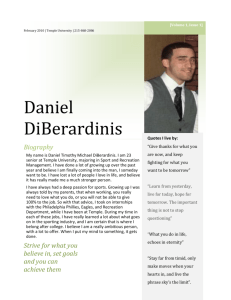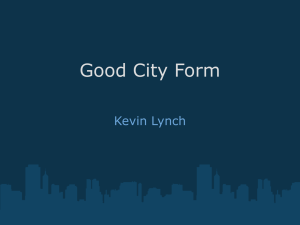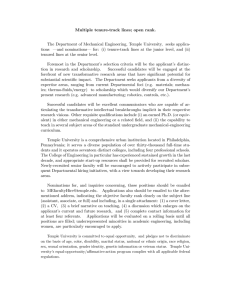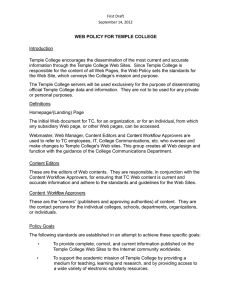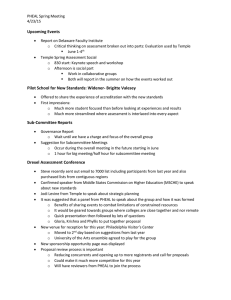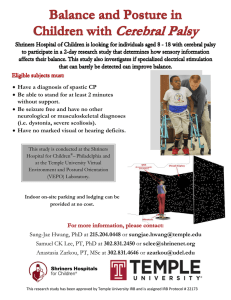WEB POLICY FOR TEMPLE COLLEGE Introduction
advertisement
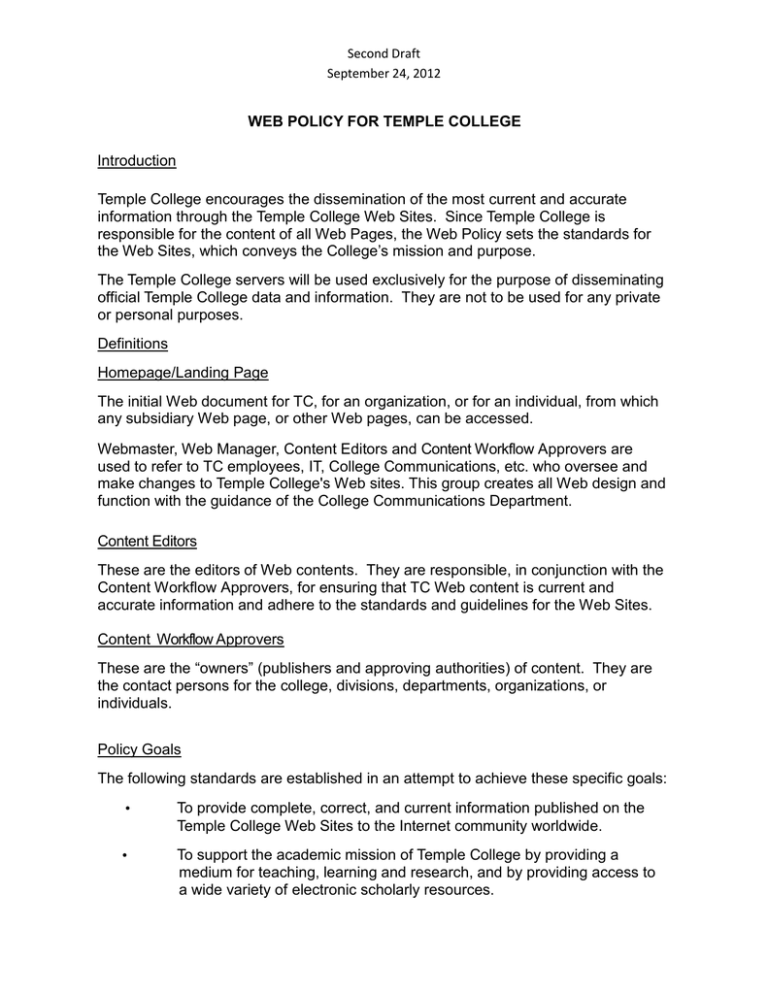
Second Draft September 24, 2012 WEB POLICY FOR TEMPLE COLLEGE Introduction Temple College encourages the dissemination of the most current and accurate information through the Temple College Web Sites. Since Temple College is responsible for the content of all Web Pages, the Web Policy sets the standards for the Web Sites, which conveys the College’s mission and purpose. The Temple College servers will be used exclusively for the purpose of disseminating official Temple College data and information. They are not to be used for any private or personal purposes. Definitions Homepage/Landing Page The initial Web document for TC, for an organization, or for an individual, from which any subsidiary Web page, or other Web pages, can be accessed. Webmaster, Web Manager, Content Editors and Content Workflow Approvers are used to refer to TC employees, IT, College Communications, etc. who oversee and make changes to Temple College's Web sites. This group creates all Web design and function with the guidance of the College Communications Department. Content Editors These are the editors of Web contents. They are responsible, in conjunction with the Content Workflow Approvers, for ensuring that TC Web content is current and accurate information and adhere to the standards and guidelines for the Web Sites. Content Workflow Approvers These are the “owners” (publishers and approving authorities) of content. They are the contact persons for the college, divisions, departments, organizations, or individuals. Policy Goals The following standards are established in an attempt to achieve these specific goals: • To provide complete, correct, and current information published on the Temple College Web Sites to the Internet community worldwide. • To support the academic mission of Temple College by providing a medium for teaching, learning and research, and by providing access to a wide variety of electronic scholarly resources. Second Draft September 24, 2012 • • To identify all Temple College Web material as being provided by the college. The distinction between official and unofficial content should always be clear. To reflect the image of the college through the quality of our Web publications. Web content should have a professional appearance, provide user-friendly tools to aid the viewer in making use of the site, and avoid those features that are distracting and annoying distasteful, or offensive. Creative design is encouraged, but only when it can be accomplished by adhering to the standards and guidelines of the Web site. Policy Statement The Temple College Web Page is an official publication of the college. All employee Web Pages linked to it and housed on the Temple College Web servers or Temple College hosted Web servers are also official publications of the college. As such, the content of these pages will support the college, its programs, faculty and staff in a manner consistent with its mission. All Web Pages must clearly state their affiliation with Temple College -- either the TC logo and/or the full name, “Temple College.” All TC web sites must be housed and maintained on TC servers or TC hosted servers. No employee Web page will be used to promote or solicit for personal financial gain. Contents of Web Pages must follow college standards regarding nondiscrimination and copyright, and may not contain offensive material or link to Web pages which contain such material. Initial Web pages created by content editors require the approval of their Content Workflow Approver. They will also be reviewed by the College Communications Office before publication. These pages must comply with established guidelines of the Web site. Subsequent changes to Web pages by content editors will be subject to the Approval Workflow Process. Categorization of TC Web Content Web content will be divided into the following categories: 1. College/Institutional Web Pages Campus-level content is information that relates to all students, department and public. 2. Distance Learning Web Pages Course-material content is required for courses taught through electronic delivery. This material will be reviewed by the Director, Distance Education. 3. Departmental Web Pages General content is related to department information. Content will be approved by department chair. Second Draft September 24, 2012 4. Course Web Pages General course material is used to teach TC courses. The TC Course Management Software should be used for course instruction materials. Instructors will be responsible for course content. Campus-level information must link to common Web Pages. 5. Faculty/Staff Web Pages Individual faculty and staff information is of a general nature, such as office location, hours, etc. Content of other organizations, including professional organizations, is required to support course instruction, or be related to student campus activities. A review of content may be made based on TC’s contractual and/or professional obligation to the organization. Responsibilities: Temple College is responsible for the content of all Web Pages. All academic and administrative units are required to have a presence on the campus Web server that is in compliance with these standards. Individual division heads are ultimately responsible for determining that their respective unit’s Web content is current, correct, functional, and standards-complaint. They are also responsible for insuring that adequate staff is allocated to Web activities to create and maintain a professional Web presence for their content. The President’s Council may review Web contents for conformity to the college policies and guidelines. The Webmaster oversees the operation of the Web site under the direction of the Director of College Communications Office. Support of the hardware and software for the campus Web servers is assigned to the Director, Telecommunications/Network. Editorship of the campus level Web content rests with the College Communications Office. Content editors are responsible for insuring that the pages they edit fully comply with the standards of the Web site, follow any divisional or departmental standards, and observe copyright regulations, all local, state, and federal laws, and college policies. Requesting a Content on the TC Web Sites Temple College has several Web sites for different purposes to dissemination information on the Internet and within the TC network. The requestor should determine the scope and purpose for publishing the Web content. The request should be sent to the Web site that meets the requirements of the content. Web content can be administrative, instructional/course related, general/public and department/ committee. The Content Workflow Approver will designate a Content Editor who will be responsible for creating and maintaining the information in those pages. Recognized student organizations must designate a sponsor who will be responsible for maintaining the content of its pages. After receiving a request for new Web Pages, the Webmaster will review the Web Page to determine the content category e.g., College, Instructional, Distance Second Draft September 24, 2012 Learning, and Departmental. The Webmaster will decide where in the TC Web hierarchy new groups of pages should reside. Directories will be created on the Content Management software and login access created for the Content Editor and Content Workflow Approver if needed. Temple College’s Official Web sites. 1. TConnect is the administrative Web site and the Web interface to the Datatel software. Access may require a password. It is maintained by the Director of Data Systems 2. Desire2Learn is the Course Management Site for providing course resources for instructors and enrolled students. Access may require a password. It is maintained by the Director of Distance Education 3. Internet WWW is the public TC internet site. Information is displayed using content management software. Content editors maintain the content with workflow approval and oversight by the College Communication department. 4. Intranet/Staff Portal is department/committee site. Department and committee Information is for TC employees and access may require a password. Department and committee maintain the content with oversight by the College Communication department. Review and Approval Temple College will not publish any Web Page that contains or promotes illegal materials, obscenity, pornography, harassment, pirated software, copyright infringement, political endorsements, defamation or libel. It is the responsibility of the Content Workflow Approver to ensure that all content in their Web pages is accurate and current. Content Editors are designated to work with the College Communications Department to ensure the representation and accuracy of the proposed electronic publication. The College Communications Office is authorized on behalf of the President to ensure that all official TC publications adequately and appropriately reflect TC’s programs, plans, and policies. The President’s Council has final authority for approving the content of Web Sites; the Web site maintainer may terminate the links to those pages until the violations are corrected. Content Workflow Approvers may appeal decisions of the College Communications Department by going to the Executive Cabinet. In addition, the College Communications Department may request a formal review by the President’s Council of specific Web content on the TC Sites.
